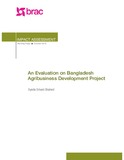An evaluation on Bangladesh agribusiness development project
Date
2015-10Publisher
BRAC Research and Evaluation DivisionAuthor
Shahed, Syeda SitwatMetadata
Show full item recordAbstract
The rural economy of Bangladesh is largely occupied by primary agricultural activities resulting in low-productivity of inputs and unemployment of rural labour. Due to limited soil productivity, the possibility of escalating rural output from harvest-oriented activity alone has not been successful. Hence, for increasing productivity, diversification and value addition in the rural economy, advancing agribusiness has been proposed as a plausible approach. The ‘Bangladesh Agribusiness Development Program’ (BADP) is a combined endeavour initiated by the Government of Bangladesh (GoB), where BRAC is involved along with two other Non-government Organizations (NGOs). The project aimed to reduce poverty in rural and semi-urban areas by increasing agribusiness activities through the provision of credit and extension services. Beneficiaries were selected from successful microfinance graduates with the potential to develop small scale business activities. BRAC operated the first phase of BADP in 180 Upazilas of 33 districts. The scope of the research looked at whether interventions improved business performance, employment opportunities and female entrepreneurship, using both quantitative and qualitative methods. For quantitative evaluation, a random sample was drawn from the operative area of the program targeting beneficiary individuals only and for qualitative evaluation, an in-depth interview was conducted with fifteen randomly chosen beneficiaries from quantitative samples. Results showed that 85% of credit was used for operating current businesses and 3.7% was actually used for opening new business ventures. Across all sectors, credit was mostly required on a short term basis. The participants were heavily trained in livestock and poultry rearing. Furthermore, it was observed that, among all production sectors, livestock breeding and poultry farming seemed to be most vulnerable. BADP succeeded to increase the mobility of women entrepreneurs. However, its success in increasing entrepreneurial activities was not widespread. The surveyed participants expressed a positive opinion regarding the contribution of BADP towards poverty reduction.

